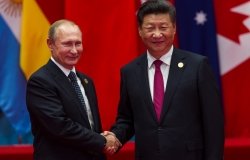"A Matter of Confidence"
Overview
By Amy McCreedy
Asia Program Associate
Makoto Utsumi
President, Japan Center for International Finance
Former Vice Minister of Finance for International Affairs, Ministry of Finance, Japan
Over lunch, Makoto Utsumi shared his thoughts on the future of Japan, stressing the political and economic challenges that face the new Prime Minister Junichiro Koizumi's administration.
According to Utsumi, Koizumi has proved himself a visionary leader, but has been short on the specifics of what his vision entails. Koizumi offered details of his economic plan only for certain projects such as privatization of the post office banking operation. Why? According to Utsumi, "his approval rating will go down if he is specific." To boost his political clout, the prime minister may call a lower-house election this summer (an upper-house election is already scheduled).
On reviving the Japanese economy, Utsumi stressed the importance of "confidence." Although Japanese businesses are recovering, the public is still wary of consuming. In some ways, the scenario is similar to the United States in the late 1980s, when restructuring forced major American corporations to lay off 3.5 million workers who were eventually absorbed by new or smaller businesses. Deregulation in Japan is prompting a similar pattern of layoffs. As soon as confidence revives, the economic situation will revive.
Yet it probably won't be in time for Koizumi, according to Utsumi. He observed that Koizumi has tried to lead the public to expect "one to two years of negative growth" as the price of reform. That way, if any positive growth is achieved, Koizumi hopes to end up looking good. But in spite of this strategy, many people expect the new administration to "deliver right away," Utsumi remarked. As a political outsider with little support from within his party, Koizumi will find his situation intensely challenging.
And what of Japan's long term prospects for economic competitiveness? Will the economy shrink as the population ages, as many Japanese fear? Utsumi dismissed the idea, maintaining that improvements in productivity will more than compensate for the shrinking workforce. The female population of Japan is particularly underutilized, and there will be no need to bring in immigrants.
On bank reform, Utsumi stressed that "U.S. participation is not productive. We [Japanese] know our own problems and what should be done." The same is true of deregulation. On security issues, too, Washington should allow Japan time to come to its own conclusions. The United States would like Japan to play a greater role in Asia, but Utsumi warned that pressing Japan too hard in this direction could prove counterproductive and provoke a public backlash. It is true that the hawkish Tokyo governor Shintaro Ishihara is greatly admired, and that the tremendously popular Koizumi favors amending Japan's pacifist Article 9. But to conclude that the Japanese electorate would tolerate an expansion of the Self Defense Forces would be a serious mistake. Perceptions may well be changing, but now is a "delicate moment" and Washington should not be heavy-handed in its approach.
Hosted By

Indo-Pacific Program
The Indo-Pacific Program promotes policy debate and intellectual discussions on US interests in the Asia-Pacific as well as political, economic, security, and social issues relating to the world’s most populous and economically dynamic region. Read more
Thank you for your interest in this event. Please send any feedback or questions to our Events staff.










